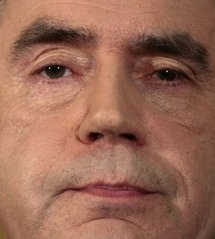Brown ally sees 'political operation' in bullying claims
Guy Jackson
LONDON, Guy Jackson - Gordon Brown's top lieutenant charged Monday that a row over bullying allegations against the British premier was part of a pre-election plot as the opposition called for an inquiry into the claims.
As commentators mulled the damage done to the governing Labour Party's prospects in a general election due by June, Business Secretary Peter Mandelson said he initially thought the row was a "storm in a teacup."

British Prime Minister Gordon Brown (AFP/File/Carl Court)
"It now looks like more of a political operation that's under way directed at the prime minister personally," said Mandelson, Brown's de facto deputy.
Extracts from a new book written by political commentator Andrew Rawnsley, which were published in a Sunday newspaper, claimed that Brown subjected staff to verbal tirades and once grabbed an advisor by the lapels.
The allegations come amid efforts by Labour campaigners to soften Brown's image ahead of the election.
The book also accuses Brown of ordering a secretary out of her chair and taking over the keyboard himself because she was "not typing fast enough", while a seat in his official car was "flecked with black marks" where he allegedly stabbed it with his pen in frustration.
The claim by Christine Pratt, the chief executive of the National Bullying Helpline, that staff at Downing Street had contacted her organisation undercut a damage limitation exercise by the prime minister's office.
Conservative leader David Cameron, favourite to win the election, called for a parliamentary official to be allowed to investigate the "serious" bullying claims, saying they were evidence of "another unseemly mess" within Brown's government.
Pratt's decision to go public seemed to have backfired when the charity's most high-profile patron Ann Widdecombe, a veteran lawmaker for the main opposition Conservatives, quit her position at the helpline late Monday.
She said she took the decision over concerns Pratt's revelations had breached callers' confidentiality.
This came after another of the National Bullying Helpline's patrons, workplace stress expert Cary Cooper, resigned, also accusing Pratt of betraying confidences.
Brown's parliamentary aide, Labour lawmaker Anne Snelgrove, who has links to the anti-bullying charity, challenged Pratt to prove that the calls "really have come from staff at Number 10 (Downing Street)".
When asked Monday if any callers had said Brown had bullied them, Pratt told the BBC: "Absolutely not, and nor have we said that Gordon Brown is a bully."
In a clear sign that the election, which is yet to be called, is fast approaching, Mandelson accused the Conservatives of directing journalists towards Pratt in the assumption she had "some fuel to throw on this fire".
But the Conservatives hit back by accusing Mandelson of attempting to "smear" Pratt.
Extracts of the book published in The Observer said Gus O'Donnell, the top civil servant, had verbally warned Brown about his behaviour -- a claim denied by O'Donnell's office.
Brown's spokesman also denied this Monday, saying that O'Donnell had "never raised concerns" with the prime minister about bullying, "let alone giving him any sort of verbal warning."
The prime minister recently gave an hour-long television interview in which he spoke candidly about holding his daughter Jennifer before she died days after her birth, in what was seen as an attempt to humanise his dour image.
But journalists say Brown's short temper is widely known in Westminster.
Jonathan Freedland wrote in The Guardian newspaper that Rawnsley had only "added to a headache that was already there. He has not created a new one."
--------------------------------------------------------------------------